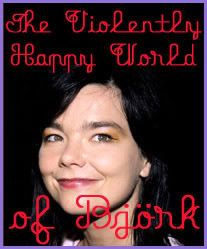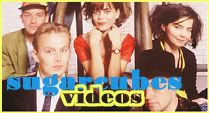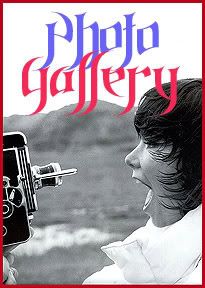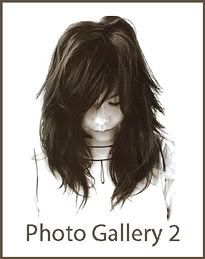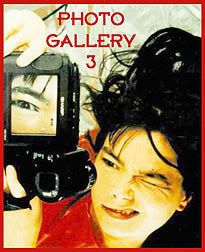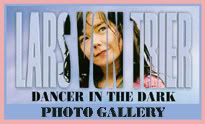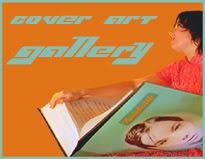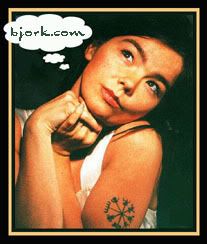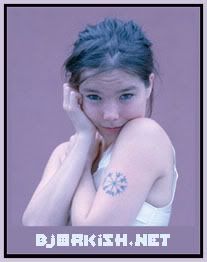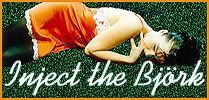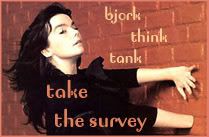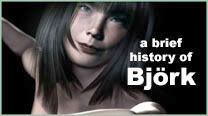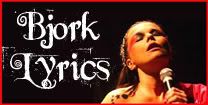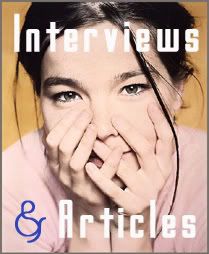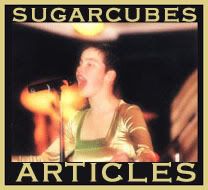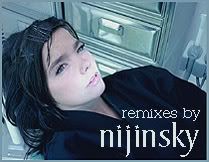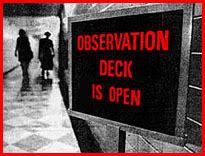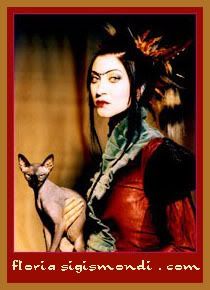Bjork Zine's Third Anniversary
 When Björk Zine celebrated its first anniversary, the blog had a little over 600 hits to its credit. Moving into its fourth year, the site has garnered a little over 11,000 hits. Like most blogs, Björk Zine is a one-person enterprise, so I’m not always able to add new entries. I have more Björk-inspired tattoos to post, for example, and promise to do that soon.
When Björk Zine celebrated its first anniversary, the blog had a little over 600 hits to its credit. Moving into its fourth year, the site has garnered a little over 11,000 hits. Like most blogs, Björk Zine is a one-person enterprise, so I’m not always able to add new entries. I have more Björk-inspired tattoos to post, for example, and promise to do that soon.
I have a lot of fun creating the “anniversary covers.” I didn’t do a second anniversary entry, so I was inspired to fill the gap and create the missing cover using one of my favorite photos of Björk.
An anniversary, however, calls for something more than a special cover. Since I strive to make Björk Zine a blog that reads like a magazine, I went searching for an interview that was a little offbeat. I normally hate articles written by writers who feel compelled to feature themselves in the story. Typically the writers will moan about the hassle of getting to the subject’s home, or the amount of time they had to wait for the subject to arrive, or the mood the subject is in and how it makes them feel. The article isn’t about them, but they manage to assume center stage as though to say, “I’m meeting this famous person and you’re not and what a pain it was even though it was ultimately worth it.”
 What follows is one of those articles. So why do I feature it? Well, beneath the obnoxious descriptions that seem intent upon casting Björk in a less than charming light, moments of revelation shine through, and at a certain point, Björk gets her revenge when she grows weary of the writer’s insipid questions. At the same time, the conversation touches on things I haven’t heard Björk talk about before. Despite the insufferable sections, it all comes together in the end.
What follows is one of those articles. So why do I feature it? Well, beneath the obnoxious descriptions that seem intent upon casting Björk in a less than charming light, moments of revelation shine through, and at a certain point, Björk gets her revenge when she grows weary of the writer’s insipid questions. At the same time, the conversation touches on things I haven’t heard Björk talk about before. Despite the insufferable sections, it all comes together in the end.
***
“I didn't like being a celebrity. It's a service job. Like washing toilets.”
A child star, quirky as her music, Björk has spent 30 eccentric years making records. She tells Polly Vernon about egg-laying, a fearless love life and binge drinking
The Observer
Björk ambles around the chintzy suite of a west
She's tired, she says; her skin's tired, which is why she's slapping on the cream. She flew into the country from
I didn't expect Björk to be eccentric in the flesh, although oddness is an integral part of her public persona, of course. Björk's been making records for 30 years; she's been an internationally recognized artist for the last 21. Through all of that, her relentless eccentricity has been her celebrity shtick. Oddness, kookiness and quirkiness have been as much a part of Björk's brand as her off-kilter, jarring, powerful sound. Björk, who wore a swan costume up the red carpet at the Oscars in 2001. Björk, who sewed pearls into her own skin for the video to 2001's 'Pagan Poetry'. Björk, who battered a television reporter at Don Muang airport in
Still, I'd assumed that Björk's eccentricities had been exaggerated in press coverage somewhat; or that they were an act. Even if they'd once been entirely genuine - she's now 41 years old, the mother of two children. Her boyfriend is Matthew Barney, leading light in
Well: very, apparently. In the flesh, Björk is brilliantly odd. Her oddness is exacerbated by the accent, the styling, but also by her constant movement, her fidgety, twisty body, her gratuitous nose twitches. And then there's her logic. For example, she'll say, on the subject of her creative process: 'Music for me is like fact. Like algebra.' And she'll expect you to understand what she means.
But we're not getting on very well. We're having a bit of a row. She's objecting to one of my questions - which I thought was mild enough. I asked her at what point in her career she first felt famous; and she's reacted badly. Really badly.
'What a question!' she says. She laughs, angrily. She looks at me. No one speaks.
Then: 'That's a bit Hello! magazine, isn't it?'
Er, is it?
'Yeah,' she says. She is very frosty indeed.
We started off OK. I asked her if she wanted to talk to me about feminism, because there's some evidence of a feminist awakening in the lyrics of her latest album,
She talked about fame instead - willingly, at first. She's endured it for a long time. Björk - born Björk Gudmundsdóttir in
The album sold well, and Björk became a star.
Was that fun?
'No! I hated it! I didn't really like it. I think children should pick for themselves. They shouldn't be pushed. I was too young.'
Does she resent her mother for allowing it?
'Little bit. She should have known better.'
Björk, child star, refused to make a second album, and ducked out of the whole business for several years. She formed a punk band called Spit and Snot when she was 14 - 'just at school, with four girls. It was fun. I played drums' - but didn't release any more records until the mid-1980s. It was then that she gained international recognition as vocalist for the Sugarcubes, a post-punky, electro-ish Icelandic outfit, which sat well among the jangly guitars and whimsy of the
She married her Sugarcubes bassist, Thor Eldon, and gave birth to their son Sindri in 1986, aged 20. Which seems incredibly young to be a mother. 'Not in
Björk and Eldo split before Sindri was two - and their band split in 1992. Björk launched herself as a solo artist with the critically acclaimed dance album Debut, in 1993, aged 27. At which point, she became truly famous, on a grander scale. How was it that time around?
'Well, it was fun to try it. If you had a paper in front of you, and like, you could pick things, before birth, that you would like to try, before you fall down and die; and that was one of the bubbles: A-list celebrity, try that out for a couple of months ... you'd probably go: yes. Tick it. Just for the experience. And to be honest, I didn't really like it. It's pretty rubbish. It feels like a service job, a bit like washing toilets or something. It feels like you are somebody else's servant. But I can tick that one off, and move to, to ... to
Really? It was that easy to duck out?
'Yep!' she says, with absolute satisfaction. 'For me anyway!'
Then I ask her what, it transpires, is the wrong question about fame, and Björk gets mad. Maybe I should have anticipated it. In 1996, celebrity turned nasty for Björk, when Ricardo Lopez, an obsessed fan, videoed himself making and mailing an acid bomb to the singer, before committing suicide. The police intercepted the device before Björk opened it, but still; it must have been grim, and maybe my focusing on Björk's fame triggered some associations. Or maybe she's just bored.
I move on, ask questions designed to engage her as a musician. But it's too late. For 20 minutes of our precious hour together, Björk is abrupt, cold, and hard:
How does she write her songs?
'I mostly write on my own, walking, outside.'
Does she do this in
'Wherever I am.'
You wake up, you get up, you go out, with writing as an end goal?
'Mmm hmmmm.'
Do you take a notebook? Or a Dictaphone? Do you write while you walk, or on park benches?
'It isn't really like that. You can't plan it.'
Then there's a long, uncomfortable pause.
I ask Björk about fashion. She's got strong associations with the industry; Alexander McQueen made her a frock for one of her videos, she's often championed the more challenging designs of people like Rei Kawakubo and Sophia Kokosolaki.
Does she love fashion?
'Not really. I don't really like it.'
I look pointedly at the Westwood shoes, and Björk relents a little.
'I like the creative angle. Where people express them-self. But I don't like it when it's too much of people being told what to do, and too much like ... fascism, of magazines telling women to starve them-self, and they obey! Or they're like "out of fashion", which is the worst crime you could ever commit! So they get executed for it, publicly! It makes women very unhappy.'
Björk's said in the past that she was surprised no one realized that the Oscar swan outfit was a joke - even though she periodically 'laid' eggs on the red carpet (at which point security guards would tap her on the arm and say: 'Excuse me ma'am. You've dropped something'). Now, she says: 'I think in
We don't have much imagination, I explain. Björk laughs. She warms up a little; then I spoil it all and ask: how does she reconcile motherhood, with pop stardom?
'Ha! You asking me again what it's like being famous, right?'
No! I'm asking you what it's like to have a very domesticated facet to your lifestyle, and also one that is traditionally associated with excess, high living, emotional volatility, drugs and groupies.
'Oh. Being a musician is very easy. My house is full of musical instruments. There's a lot of music, always. But... I don't really go to premieres and hang out with Puff Daddy.'
(I refrain from saying that I didn't for one moment think that she did, and that, furthermore, he's called P Diddy.)
It isn't until Björk has some room-service soup that things start to look up. She mellows considerably. 'It's my blood sugar,' she explains. 'It goes a bit ... haywire.'
I ask her some more searching questions; and she responds well. Björk's been with Matthew Barney for six years; before that, she'd had a series of relationships, some of which were high-profile. She dated UK Nineties music institutions Tricky (of Massive Attack) and Goldie, for a start. The two were supposed to have fought over her.
Does she fall in love easily?
'Erm. Hmmm.' She giggles. 'I mean, there's been many different periods in my life ... there's definitely been places where I fell really easily in love. And, erm, all the different colours ... I think I'm the sort of person who - I wouldn't play it safe. Again, if you have the ticky boxes in front of you, and you have all the different emotional feelings, to do with love ... then I think I wanted to taste all of them, at least once. I also wanted to taste rejection, I wanted to taste being heartbroken, being obsessed, I wanted to feel being superior, I wanted to feel being equal, I wanted to, erm, experience, being ecstatic, the joy, the freedom, the recklessness, the conservative side ... the domestic life ...'
And has she experienced all these things?
'All of these colours! Yeah!'
She seems fearless, romantically. Is she scared of anything?
'Yeah! Tons! Tons of stuff, but that's part of the fun, though, isn't it? And it's not like I said: OK, I decide, 17 March, I will be heartbroken ... it's not like that. And I look at my friends, and there are some people who play it safe, and they don't want to take risks.'
I'm one of those, I tell her.
'But that's not bad, either! It is also brave to keep things together. That takes guts too.'
Björk likes me in the end. We talk about shopping: 'I like it! But it really exhaust me. I get highs, to be totally honest, in second-hand shops. My hunting instinct, I expect, really kicks in.' We talk about ageing. There's something very childlike about her, there's the 12-year-old boy in her spoken inflections, and the high-voltage eccentricities. She's also got the posture of someone much younger; and the skin. But still - she is 41.
'I'm pretty comfortable with it when it comes to experience, maturity, er, wisdom; but I'd be lying if I said that it don't piss me off that I don't have the same energy I used to have when I was 20.'
Where does she stand on the ravages of time?
'Right now, I feel like I look exhausted, because I'm tired. I'm not vain, like: I want to look pretty. That's never bothered me. But if I see a photograph of me and I look tired, then I'd be more worried than if I looked ugly.'
She has a nice life; a sociable life, with her kids, her friends, and regular house parties, which she enjoys 'because you can be really picky about the music and only play what you like'. She's about to tour Volta, which she thinks will be fine because she's negotiated a month-on, month-off deal with her label, so that she can spend time with Isadora. She likes a drink.
'I don't like drinking with food, I think Iceland people are a bit old-school like that - we think if you drink with food then you're an alcoholic ... but if you drink lots, on a Friday night ...'
Then you're fine?
'Yes. I think it's called "binge drinking". I don't see the point of drinking unless you end up dancing and letting go. I actually read somewhere that, if you look over a 40-year period, it's better for your body because then you get rid of so much stress. Two glasses of wine, good for your heart? Yeah, whatever. I just wake up next day and I'm a bit like, black and white, not in colour. But lots of drink, bit of dancing, bit of slapstick... is good! Thing is, you can't do that, that often. Twice a month would be good... but I can't wait, I think, fuck it!'
Is Björk happy?
'I'm just like anybody,' she says, 'I have my ups and downs.' She kicks her bare feet out a bit. 'It's not like bliss, 24/7 or anything.' She sniffs. 'Shame about that, innit?' Then she laughs, and boots me out of her hotel room.
